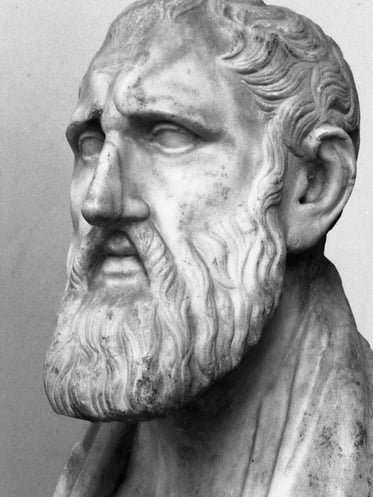Build a Stronger, More Beautiful You—Through Strength Training, Nutrition, and Community.

Zeno of Citium
& Other Stoic Quotes
Explore the wisdom of Zeno of Citium, the famous founder of Stoicism, as well as of other Stoics.
Zeno of Citium, born around 334 BC in Citium (modern-day Larnaca, Cyprus), was the founder of Stoicism, one of the most influential schools of philosophy in the Hellenistic and Roman worlds. Originally a merchant, Zeno turned to philosophy after losing his wealth in a shipwreck, a pivotal event that led him to Athens, where he began studying under various philosophers.
Around 300 BC, Zeno established his own school in the Stoa Poikile, a painted colonnade in Athens, from which the name "Stoicism" is derived. Zeno’s teachings emphasized the importance of living in accordance with nature, which he believed meant living a life of virtue guided by reason. For Zeno, the goal of life was to achieve eudaimonia, or flourishing, which could be attained by cultivating wisdom, courage, justice, and temperance.
Zeno's influence on Stoicism was profound, laying the foundations for the teachings of later Stoic philosophers like Cleanthes, Chrysippus, Seneca, Epictetus, and Marcus Aurelius. Zeno's life and work emphasized simplicity, self-discipline, and the pursuit of wisdom, principles that continue to inspire those who seek to live a virtuous and meaningful life. Zeno passed away around 262 BC, but his legacy as the founder of Stoicism endures, offering a path to tranquility and resilience.
"Happiness is a good flow of life." – Zeno of Citium
"Well-being is realized by small steps, but is truly no small thing." – Zeno of Citium
"Fate is the endless chain of causation, whereby things are; the reason or formula by which the world goes on." – Zeno of Citium
"The goal of life is living in agreement with nature." – Zeno of Citium
"No evil is honorable: but death is honorable; therefore death is not evil." – Zeno of Citium
"The reason why we have two ears and only one mouth is so that we may listen more and talk less." – Zeno of Citium
"Nothing is more hostile to a firm grasp on knowledge than self-deception." – Diogenes of Babylon
"The wise man is self-sufficient; that means he is able to enjoy his own company." – Diogenes of Babylon
"Contentment comes from wanting what we need rather than having what we want." – Diogenes of Babylon
"The sage does not have mere opinions, but only knowledge." – Diogenes of Babylon
"Reason is a more powerful weapon than anger." – Chrysippus
"The universe itself is God and the universal outpouring of its soul." – Chrysippus
"Living virtuously is equal to living in accordance with your experience of the natural course of things." – Chrysippus
"Virtue is the health of the soul." – Chrysippus
"What is good in life is achieved through reason and virtue." – Chrysippus
"A bad feeling is a commotion of the mind repugnant to reason, and against nature." – Chrysippus
"True philosophy consists in following nature's rules." – Cleanthes
"He has the most who is content with the least." – Diogenes of Sinope
"I threw my cup away when I saw a child drinking from his hands at the trough." – Diogenes of Sinope
"The foundation of every state is the education of its youth." – Diogenes of Sinope
"Why not whip the teacher when the pupil misbehaves?" – Diogenes of Sinope
"I am looking for an honest man." – Diogenes of Sinope
"Man conquers the world by conquering himself." – Zeno of Tarsus
"There is no good thing which is not also beautiful." – Zeno of Tarsus
"The ideal of character for the Stoic is to be like a rock, solid and unmovable in the midst of adversity." – Zeno of Tarsus
"Virtue is nothing else than the highest degree of perfection of the soul." – Zeno of Tarsus
"We are but a momentary spark in the great fire of the universe." – Posidonius
"No evil is honorable; but death is honorable; therefore death is not evil." – Posidonius
"Wisdom is the knowledge of things divine and human." – Posidonius
"It is virtue, virtue, which both creates and preserves friendship." – Posidonius
"When external circumstances are at odds with our will, we should submit to the divine order and be content." – Musonius Rufus
"The greatest thing in all education is to make the young delight in virtue." – Musonius Rufus
"We must begin by controlling our desires before we can hope to control anything else." – Musonius Rufus
"Every person's mind is an inner citadel, and in this citadel we find our strength." – Musonius Rufus
"Poverty brought with it principles, which although they seem harsh and unpleasant at first, were also useful to the hardening of character." – Cato the Younger
"He who fears death lives not." – Cato the Younger
"Remember that it is better to die on your feet than to live on your knees." – Cato the Younger
"Never was anything great achieved without danger." – Cato the Younger
"I am not ashamed to confess I am ignorant of what I do not know." – Cato the Younger
"The greatest empire is to be master of oneself." – Pythagoras (Stoic thinkers often referenced him)


Follow us on Social Media!
Join our movement today!
© 2025. All rights reserved.


